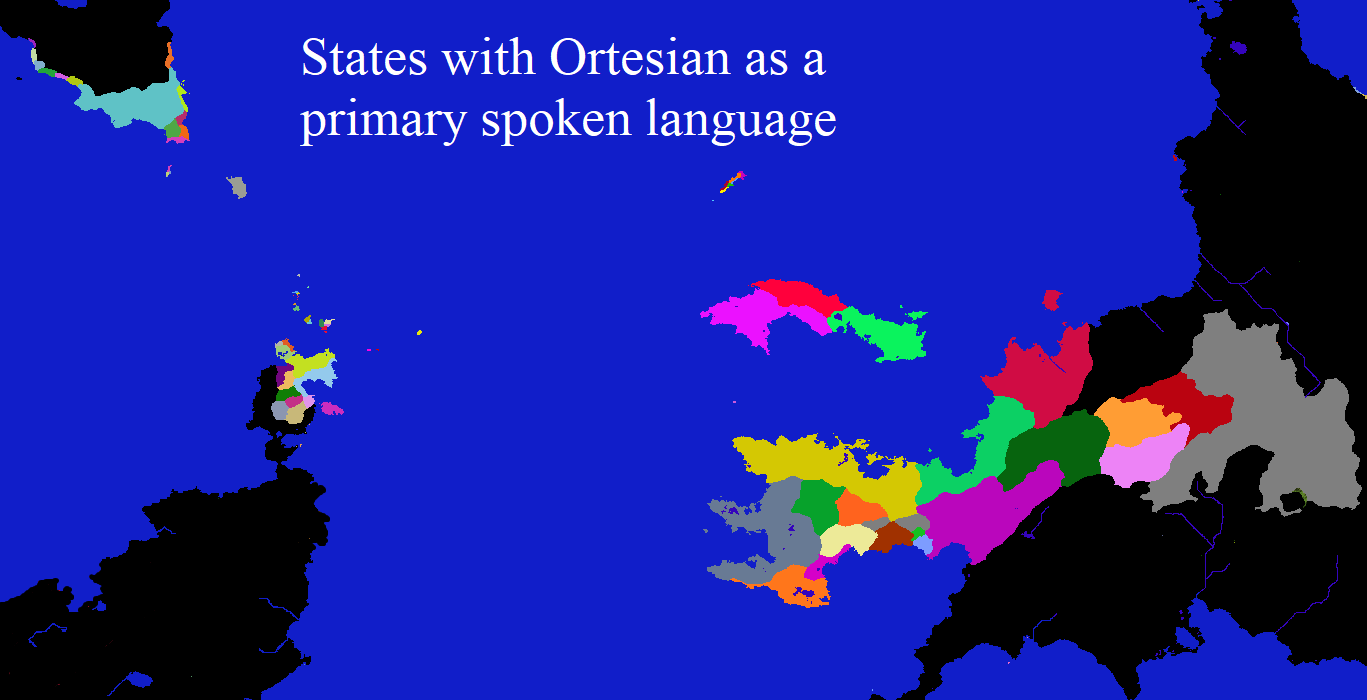Ortesian Language
Ortesian is the language and language family of Northern Maradia, and Ortesian dialects are spoken all across the continent as a trade language. Engineers, merchants, and emissaries from South Maradia to Ukaram to West Ekraht speak this language, and it is considered the holy tongue of Keveket.
At the heart of the Ortesian language is "true Ortesian": the dialect of ancient Agamine, preserved through repetition and holy text. All variant dialects are seen as errors, and Keveket priests do their best to move the language back to its roots whenever possible.
Aside from Keveket faithful or Maradian merchants, engineers around the world consider the language to be important as a kind of universal mathematician's tongue. While spoken Ortesian isn't very "mathematical", whatever that would mean, the written version is connected to a very easy-to-use numeral system that was one of the first to include zeroes and negative numbers. Many scholarly works on mathematics use Ortesian numerals and writing to show their quality, even in far-flung continents.
Ortesian names are used across Maradia. Gendering is entirely dependent on the parents and individual, with no set standards.
Names for everyone:
Generally speaking, Ortesian is a mashup of Latin and Indonesian. While these are linguistically mulched beyond most recognition, you could probably dabble a bit in either Latin or Indonesian. Indonesian is probably a safer bet, given the recognizability of many Latin names.
Ortesian Names
- Violo/Viola (Beloved)
- Vetua (Elder)
- Prita/Pritam (eldest, first)
- Relu (heir)
- Anear (our child)
- Kelula (moon-borne)
- Silus (safekeeper)
- Emia/Emio (crabherder)
- Mako (crowned)
- Jimalah (the soul allows
- Larela/Larelo (of the sea)
- Arhan (tree)
- Naralo/Narala (of the boats)
- Awavi (without need)
- Perkeva/Perkev/Perket (seeks truth)
- Perisa/Periso (seeks laughter)
- Persilum or Percy (Seeks refuge)
- Togu (thunderous)
- Ulanya (belonging to the island)
- Eradahl (seeks sweet things)
- Arahja (warrior of light)
- Kesu (Cat)
- Norima (new soul)
- Paeman (builder)
- Ovlen (birdlike)
- Luvina (clever)
- Kebet (truthful)
- Dimja (obedient)
- Truda (purpose)
- Sedris (sleepy)
- Selpaka (fast child)
- Peri (dancer)
- Sandra (wakeful)
- Bren (hope)
- Keltis (virtue)
- Kahada (joyful)
- Mulsa (sweet)
- Harwen (the next)
- Dorla (the body allows/is able)
- Kimela (death allows them)
- Vermia (hunter)
- Kortha (worker)
- Ankila (sickness allows them)
- Badila (floods allow them)
- Selem (likes jumping)
- Kelesper (bat)
- Tintem (tall)
- Renn (short)
- Kesalia (musician)
- Borimia (thinker)
- Premja/Premji (guardian)
- Ulania (forest-dweller)
- Ampasu (of the mind)
- Kebetu (of the truth)
- Akimia (bricklayer)
- Diamia (teacher)
- Kess (calm)
- Salanar (owns animals)
- Kelatu (of stone; classic, natural, desirable)
- Kelo (metal; firm, stubborn, useful)
- Pergalis/Pergal (seeks salt; hungry, wishful)
- Hepasu (of bronze; traditional, lasting)
- Letemsu (of clay; soft and teachable)
- Regenem (adamantium person; heavy, powerful, loud)
- Bemetu (of dirt; average, normal)
- Eranem (golden person; soft, sophisticated, complex)
- Inetu (of silver; shining, tasty, beautiful)
- Tennem/Tennitu (copper person/of copper; superior, strong)
- Vesunem (iron person; contains hidden strength)
- Giala (born of Jade; precious, fiery, emotional)
- Versanem/Versatu (of quartz; associated with prosperity)
- Krekena (tin; unique, insightful)
- Beleris/Belera (sulfurous; warlike, dangerous, powerful)
- Plumpa/Plumpu (leaded one; stubborn, heavy, quiet)
- Tosa/Tosu (bone; mysterious, exotic, foreign)
- Saprasa/Saprasir (sandstone; patient, thoughtful, layered)
- Vitna (amber; pious, eternal, reverent)
- Spelta (zinc-born; precious, fragile, beloved, gentle)
- Bepi/Bepo (obsidian; reborn, renewed, heir)
- Eprina/Eprinem (born of flint; sharp, clever)
- Ementa (descended from the primordial earth)
- Kagrala (the world turtle allows)
- Agniel (of the smith-god)
- Telespa (of the song goddess)
- Perkeva (seeks divine truth)
- Elania (cosmic resident)
- Perava (seeks prophecy, associated with Aviwari, the mole-prophet)
- Magnamio (thunder-bringer, related to a now-defunct god of fire, thunder, and prophecy)
- Lumita (from 'Lumitay', a now-defunct Goddess of the sea, luck, and second chances)
- Lumana/Lumano (from 'Lumanol', ancient god of magic)
- Heshaba (after the now-defunct Goddess of cats, oaths, and discovery)
- Emeted
- Malared
- Ariged
- Hasparek
- Muriked
- Pritanek
- Vetarek
- Mekted
- Baterek
- Huvared
- Rekarek
- Anared
- Noralek
- Tinared
- Turarek
- Inavered
- -tra, -tru: destined
- -rek: family
- -la, -lah: allows
- -ted: descended from
- -ula: born of
- -mia: one who
- -lania: dweller in
- -nem: person
- -tu, -su: of
- In-: without
- Per-: seeker of
How to Generate a Maradian Name
Remove these ads. Join the Worldbuilders Guild




Comments